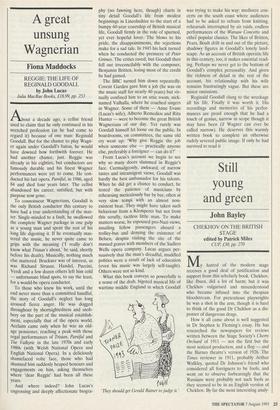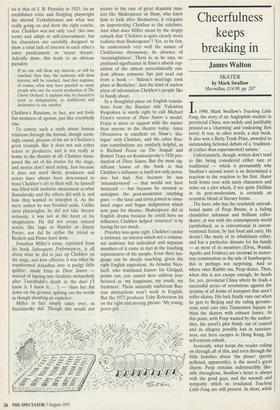Still young and green
John Bayley
CHEKHOV ON THE BRITISH STAGE edited by Patrick Miles CUP, £30, pp. 270 hatred of the modern stage receives a good deal of justification and support from this scholarly book. Chekhov, like Ibsen, did a lot of harm; but it was Chekhov vulgarised and misunderstood who became infused into the thespian bloodstream. For pretentious playwrights he was a shot in the arm, though it is hard to think of the good Dr Chekhov as a dis- penser of dangerous drugs.
How it all came about is well suggested in Dr Stephen le Fleming's essay. He has researched the newspapers for reviews written between the Stage Society's Cherry Orchard of 1911 — not the first but the • most noticed production, and a flop — and the Barnes theatre's version of 1926. The Times reviewer in 1911, probably Arthur Walkley, quoted Dr Johnson's friend who considered all foreigners to be fools, and went on to observe forbearingly that the Russians were probably not such fools as they seemed to be in an English version of sis is that of J. B. Priestley in 1925. As an established critic and fledgling playwright the shrewd Yorkshireman saw what was really going on and drew the right conclu- sion. Chekhov was not only `cool' (his own term) and adept at self-concealment, but his characters are carefully designed to show a total lack of interest in each other's inner predicament or `secret dream'. Adroitly done, this leads to an obvious paradox:
If' no one will show any interest, or will be touched, then they, the audience, will show interest, will be touched. And that explains, of course, what may have puzzled so many people who saw the recent production of The Cherry Orchard; it explains why its characters seem so independent, so indifferent and inattentive to one another.
Chekhov's Russians, in fact, are not fools but monsters of egoism, just like everybody else.
To convey such a truth about human relations through the formal, though seem- ingly casual, process of his art is Chekhov's great triumph. But it does not suit either actors or producers, and is not really at home in the theatre at all. Chekhov trans- posed the art of his stories for the stage, and stories don't need acting. Just because it does not need them, producers and actors have always been determined to bend Chekhov's art to their will: he himself was filled with sardonic amazement at what Stanislaysky and the others did with it, and how they wanted to interpret it. As the mere author he was brushed aside. Unlike most playwrights, he did not take theatre seriously: it was not at the heart of his imagination. He did not create natural actors, like Iago or Hamlet or Jimmy Porter, nor did he stylise the trivial as Beckett and Pinter have done.
Jonathan Miller's essay, reprinted from his book Subsequent Performances, is all about what he did to jazz up Chekhov on the stage, and how effective it was when he transformed Arkadina into `a pudgy little spitfire', made Irina in Three Sisters instead of lapsing into fatalistic melancholy after Tuzenbakh's death in the duel CI knew it, I knew it. . . ') — 'slam her fist down on the ground, spitting out the words as though shouting an expletive'.
Miller in fact simply takes over, as Stanislaysky did. Though this would not matter in the case of great dramatic mas- ters like Shakespeare or Shaw, who knew how to look after themselves, it relegates an unprotesting Chekhov to the sidelines. And what does Miller mean by the sloppy remark that `Chekhov is quite clearly more realistic than Shakespeare'? Yet, to be fair, he understands very well the nature of Chekhovian throwaway, its absence of `meaningfulness'. There is, as he says, no profound significance in Irina's absent rep- etition of the almost surrealistically ran- dom phrase someone has just read out from a book — `Balzac's marriage took place at Berdichev'. Just the kind of useless piece of information Chekhov's people like to bandy about.
In a thoughtful piece on English transla- tions from the Russian side Valentina Ryapolova is surely right to call Michael Frayn's version of Three Sisters a model. Frayn is more en rapport with the master than anyone in the theatre today. Anna Obraztsova is excellent on Shaw's 'dia- logue' with Chekhov, and the other Rus- sian contributions are similarly helpful, as is Richard Peace on The Seagull and Robert Tracy on Komisarjevsky's 1926 pro- duction of Three Sisters. But the most sig- nificant lesson of the book is that Chekhov's influence is itself not only perva- sive but bad. Not because he was `misunderstood' — that would not have mattered — but because he seemed to anticipate the post-modernist `anything goes' — the farce and trivia joined to simu- lated anger and bogus indignation which now pass for theatre. Shakespeare did in English drama because he could have no influence; Chekhov helped 'resurrect' it by having far too much.
Priestley was quite right. Chekhov's point is intimacy, an interest which not a commu- nal audience but individual and separate members of it come to feel in the touching separateness of his people. Even their lan- guage can be deeply touching, given the right English equivalent. As Ariadne Nico- laeff, who translated Ivanov for Gielgud, points out, you cannot here address your beloved as `my happiness, my youth, my freshness'. Those naturally exuberant Rus- sian abstractions won't work in English. But the 1972 producer Toby Robertson hit on the right and moving phrase: `My young, green girl. . . '



















































 Previous page
Previous page